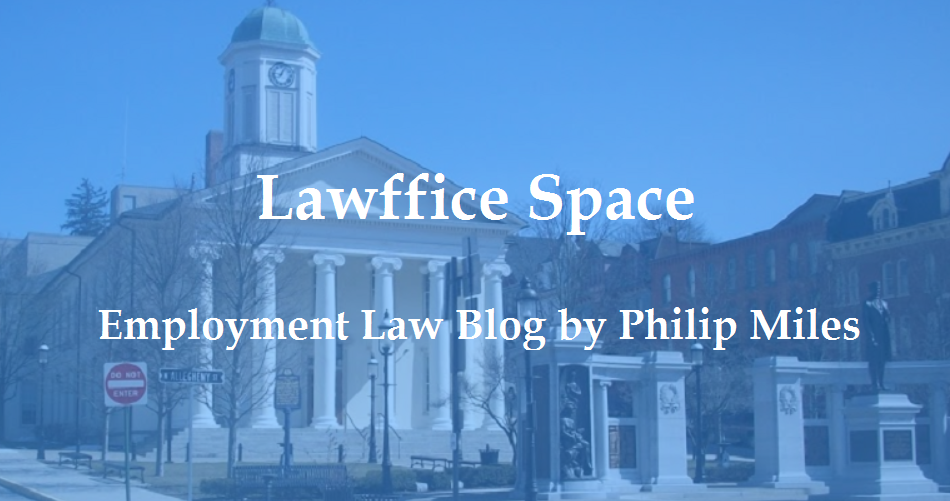When employers and employees part ways, they often enter into separation agreements. The agreement almost always includes a waiver and release of all claims (including discrimination). Often, the agreement also includes a clause stating that the employee cannot re-apply for employment with that employer (or understands that (s)he will not be re-hired). These clauses are pretty common, so I was surprised when an EEOC attorney at the conference stated that the agency takes the position that such clauses are unlawful (vaguely referencing retaliation).
Really!? I went off in search of more information. I couldn't find much, but I did find this white paper by Wendi Lazar of Outten and Golden: Settling the Case and Wrapping Up Employment: Negotiating Strategies, Drafting Realities:
See Tom Gilroy, EEOC Opposes Settlement Clauses That Bar Re‐Application and Rehiring, BNA DAILY LABOR REPORT, Apr. 4, 2008, at C1 (stating that “the agency opposes as a matter of policy both ‘no‐hire’ and ’no‐re‐apply’ covenants” as such clauses “are not good public policy, since they could be viewed almost as retaliation for coming forward for a discrimination claim”). At an ABA Labor and Employment Law Section meeting on April 3, 2008, an EEOC attorney stated that the Commission will oppose so‐called “no rehire” or “re‐application” clauses in settlement or employment agreements. See http://suitsintheworkplace.com/blogs/archive/2008/04/05/827.aspx. However, case law on the issue seems to suggest just the opposite. To date, courts and the EEOC have upheld settlement agreements or any other agreements containing no re‐employment provisions. See Jencks v. Modern Woodmen of America, 479 F.3d 1261, 1265‐66 (10th Cir. 2007) (affirming district court’s holding that employee waived entitlement to re‐employment or reinstatement with the employer in an enforceable settlement agreement and that such agreement was a "legitimate non‐discriminatory reason for declining employee's application"); Austin v. Spirit Airlines, Inc., No. 08 Civ. 60540, 2008 WL 4927003, at * (S.D. Fla. Nov. 17, 2008) (on motion to enforce a settlement agreement, compelling plaintiff to execute a full settlement agreement, including a no‐rehire provision); Salerno v. City Univ. of N.Y., No. 99 Civ. 11151, 2005 WL 578944, at *3 (S.D.N.Y. Mar. 10, 2005) (imposing a settlement judgment that included a no‐reemployment provision and noting that “a bar on future employment is not unusual”)); Franklin v. Burlington N. & Santa Fe Ry. Corp., No. 03 Civ. 228, 2005 WL 517913 (N.D. Tex. Mar. 3, 2005), aff'd, 174 Fed. Appx. 831 (5th Cir. Apr. 5, 2006) (holding that employee failed to show that employer’s refusal to process plaintiff’s application on the basis of the separation agreement, which the company believed to include a no‐rehire provision, was pretextual); Khou v. Methodist Hosps. of Dallas, 2004 U.S. Dist. LEXIS 4148, (N.D. Tex. 2004), aff'd, 2005 U.S. App. LEXIS 4206 (5th Cir. 2005) (court affirmed judgment against an employee who applied for a job after entering into a separation agreement where employee promised to voluntarily and permanently resign); Homeport Ins. Servs., Inc. v. Lundy, B236276, 2012 WL 5385640, at *5 (Cal. Ct. App. Nov. 5, 2012) (finding no reemployment provision to be enforceable) (unpublished/noncitable); O'Brien v. Potter, 2004 EEOPUB LEXIS 448 (Feb. 3, 2004) (holding that the settlement agreement between the parties, which included a no‐rehire provision, was enforceable); Jablonski v. Battista, EEOC DOC 01A23730 (Sept. 17, 2003) (enforcing no re‐employment clause in agreement).Sorry for the long bloc quote with string citation, but it really does a great job of addressing the issue (sadly, the blog link seems to be dead).
The EEOC attorney's position was not well-received at the conference, and she acknowledged that zero case law supports the position. One audience member "politely" suggested that if they couldn't find a single court to side with them in 50+ years, perhaps it was time to move on. The EEOC attorney responded that the agency often seeks to move the law and alter the status quo.
I certainly understand the agency's role in changing the law. However, this places employers in the unenviable position of choosing between what the law apparently allows, and drawing fire from the EEOC as a test case.

No comments:
Post a Comment